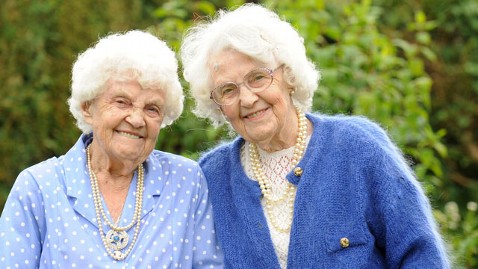Oldest Twins in World Celebrate 102nd Birthday

The oldest twins in the world had their cake and ate it too when they celebrated their 102 nd birthday Wednesday. Ena Pugh and Lily Millward of Wales chalked up their centenarian health to "laughter and a good joke."
The twins' families presented the sisters with the most recent edition of the Guinness Book of World Record so they could check out their new entry, according to the UK's Sun. Pugh and Millward were born on January 4, 1910, making them the oldest pair on the planet.
Born to farmers in Garthbrengy, near Brecon, Wales, Millward and Pugh were two of 10 children. They are the only siblings still living, and both sisters' husband's died about 20 years ago. The twins have 15 grandchildren and 12 great-grandchildren between them. The sisters reportedly talk on the phone every day despite both having significant hearing loss, and only recently have their weekly shopping and tea sessions slowed down because Millward broke her hip after a fall.
Nevertheless, the women were together on their birthday, and expressed gratitude for being blessed with happiness and good health.
"We used to work on the farm all day, but we would enjoy ourselves," Millward told the Wales News Service. "It was a lot of fun and sociable. We've been very lucky and we have always had good health."
But even in an era of complex exercise regimens, perfect diets and juice cleanses, it is genes more than lifestyle, that play a major role in whether a person will reach centenarian proportions.
"At higher and higher ages, genetics play a larger and larger role," said Dr. Alan Shuldiner, director of endocrinology, diabetes and nutrition at University of Maryland. "Many centenarians eat unhealthy diets, smoke, never exercised. I suspect genetics is a large reason why they have lived 204 years between them."
About 84,000 centenarians live in the United States, and that number is expected to grow to 10 times that by 2050, according to the U.S. Census Bureau. While a study back in 2010 found that genes played a direct effect into a long life expectancy, 30 percent of the centenarians studied had a lifestyle that played a large role in their longevity.
Those lifestyle factors include the ones we should all know by now: exercise, a healthy diet, keeping weight off, not smoking, limiting alcohol, staying social and keeping the cognitive function fresh with reading and crossword puzzles.
Longevity is a complex process, said Dr. Heidi Tissenbaum, professor in the program of gene function and expression at University of Massachusetts Medical School.
"Although there are many that say a positive attitude is good, as well, thus far, studies on centenarians have shown that there is not one environmental factor that stands out," she said.
"Clearly genetics play an important role and the fact that this is seen in twins confirms that, no less genome sequencing findings," said Dr. Eric Topol, director of Scripps Translational Science Institute in San Diego. But he notes, "laughter didn't get known as the best medicine by accident!"